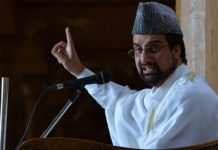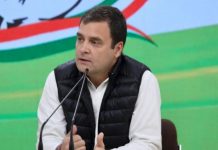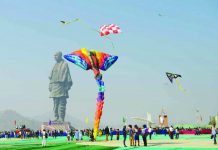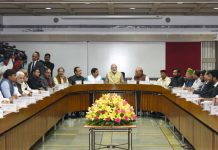 On January 21, BJP general secretary Ram Madhav said his party will go it alone in the upcoming Jammu and Kashmir assembly elections and it would form a “stable government with some friends” in the state after the polls. But a cursory glance at the political landscape reveals that unlike the last time the BJP may be hard-pressed to find such friends. National Conference and the PDP, the major regional political forces have made it clear that they won’t enter into any prepoll or post-poll alliance with the saffron party.
On January 21, BJP general secretary Ram Madhav said his party will go it alone in the upcoming Jammu and Kashmir assembly elections and it would form a “stable government with some friends” in the state after the polls. But a cursory glance at the political landscape reveals that unlike the last time the BJP may be hard-pressed to find such friends. National Conference and the PDP, the major regional political forces have made it clear that they won’t enter into any prepoll or post-poll alliance with the saffron party.
PDP president Mehbooba Mufti has compared her broken alliance with the BJP as the “cup of poison”. And the National Conference which looks favourite to emerge as the single largest party has already thrown its lot with the country’s opposition. The NC president Dr Farooq Abdullah attended the United Opposition Rally organized by West Bengal Chief Minister Mamata Banerjee at Parade Ground in Kolkata. Most likely the National Conference will choose to go with the Congress in a post-poll scenario, should the both parties get the required number of seats to form the government. The NC, however, has been trying to gain the majority on its own.
This leaves the smaller parties like the People’s Conference led by Sajad Gani Lone, which is perceived to be close to the BJP leadership. However, the PC’s all time highest score in an
Assembly election is two seats. This hardly gives the party a role in government formation. However, in recent past, the PC has been strengthened by the entry of some leaders from the PDP, each of whom can boast of a constituency of their own. But even with their support, the PC is unlikely to cross five seats. The PDP’s fate is likely to be similar. Its three year government in coalition with the BJP has made it unpopular to an extent where few people expect it to do well.
This makes the NC, BJP and the Congress only parties with a credible shot at government formation. Here again the BJP is the odd one out. For, neither the NC nor the Congress will ally with it. This can create a problematic situation for the state in case the BJP repeats 2014 poll performance in Jammu: the party had won 25 of 37 seats in the Hindu majority province. And the PDP had emerged as the single largest party in the state with 28 seats, making its coalition with the BJP a structural necessity. But in power, the coalition turned out largely to the detriment of the PDP. And 2016 unrest which led to the killing of around 100 persons and blinding of several hundred further discredited the PDP.
The BJP itself hasn’t helped the matters by turning out to be an unreliable partner. In June last, the party unilaterally pulled out support to the then Chief Minister Mehbooba Mufti leading to the fall of the government. “The BJP has thus burnt its boats with the major regional parties,” says Gowhar Geelani, the political commentator. “The alliance with the BJP is too costly a political gamble to be worth a repeat”.
The probable loss of the government by the BJP at the Centre could make things more difficult. “Only a BJP-led central government can turn things in the party’s favour. This brings into play factors that go beyond the political interests of regional party,” says Naseer Ahmad, a columnist. “Central government has the power to interfere in the state’s political affairs.In Kashmir, it is seen capable of making and breaking the parties. So, a regional party will be chary of antagonizing the government at the centre”.
A case in point is the dismissal of the Farooq Abdullah led NC government in 1982 and the formation of a new government constituted of Congress, then a ruling party at the centre, and a breakaway faction of the NC led by Ghulam Mohammad Shah, the brother in law of Abdullah.
Similarly, the BJP is alleged to have attempted to similarly break the PDP in 2016 when Mehbooba refused to renew alliance with the party following the death of her father, the then Chief Minister Mufti Mohammed Sayeed. The PDP, in a recent statement, said that its senior leader Altaf Bukhari had tried to usurp the chief ministership by seeking to break the PDP up on the urging of the RSS.
The BJP is also alleged to have tried to install the PC leader Sajad Lone as the Chief Minister by getting him the required number of seats by breaking the PDP and the NC. And just when the alleged plan was due to reach its logical conclusion, the PDP, the NC and the Congress came together in a grand alliance to stake claim to form the government. At the same time Lone also staked claim, asserting he was supported by the requisite number of candidates from the other parties. In response, the Governor Satya Pal Malik dissolved the Assembly. Later, in a speech, Malik indicated that he was under pressure from New Delhi to install Lone.
“I would like to make it clear once again, that if I would have looked towards Delhi, I would’ve been forced to form Lone’s govt and I would have gone on to be remembered as a dishonest man in the annals of history,” Governor Satya Pal Malik had said at a function in New Delhi shortly thereafter. “That’s why I ended the matter. Some will hurl abuses but I am convinced that I had done a good deed.”
Post-election scenarios can thus throw up interesting scenarios. In the absence of a BJP government at the centre, the party is unlikely to find allies in the state. So, any government can be formed between secular-minded parties like National Conference and Congress and in case of a shortfall of seats, the duo can take support from smaller parties and possible independents.
Congress has been a part of the two successive coalition governments — first with the PDP and the second with the NC — from 2002 to 2014. Both coalitions lasted their terms unlike the BJP-PDP government which continued for half the term only.
“In a sense, the BJP hasn’t helped matters for itself by not letting the coalition with the PDP function smoothly,” says Geelani. “At the same time, it is also true, the J&K is not important for the BJP in terms of the government formation. The state is important for the party to mobilize electorate in the rest of India. So, the party would rather be seen as hardline on the state than worry about forming a stable state government”.
letters@tehelka.com












